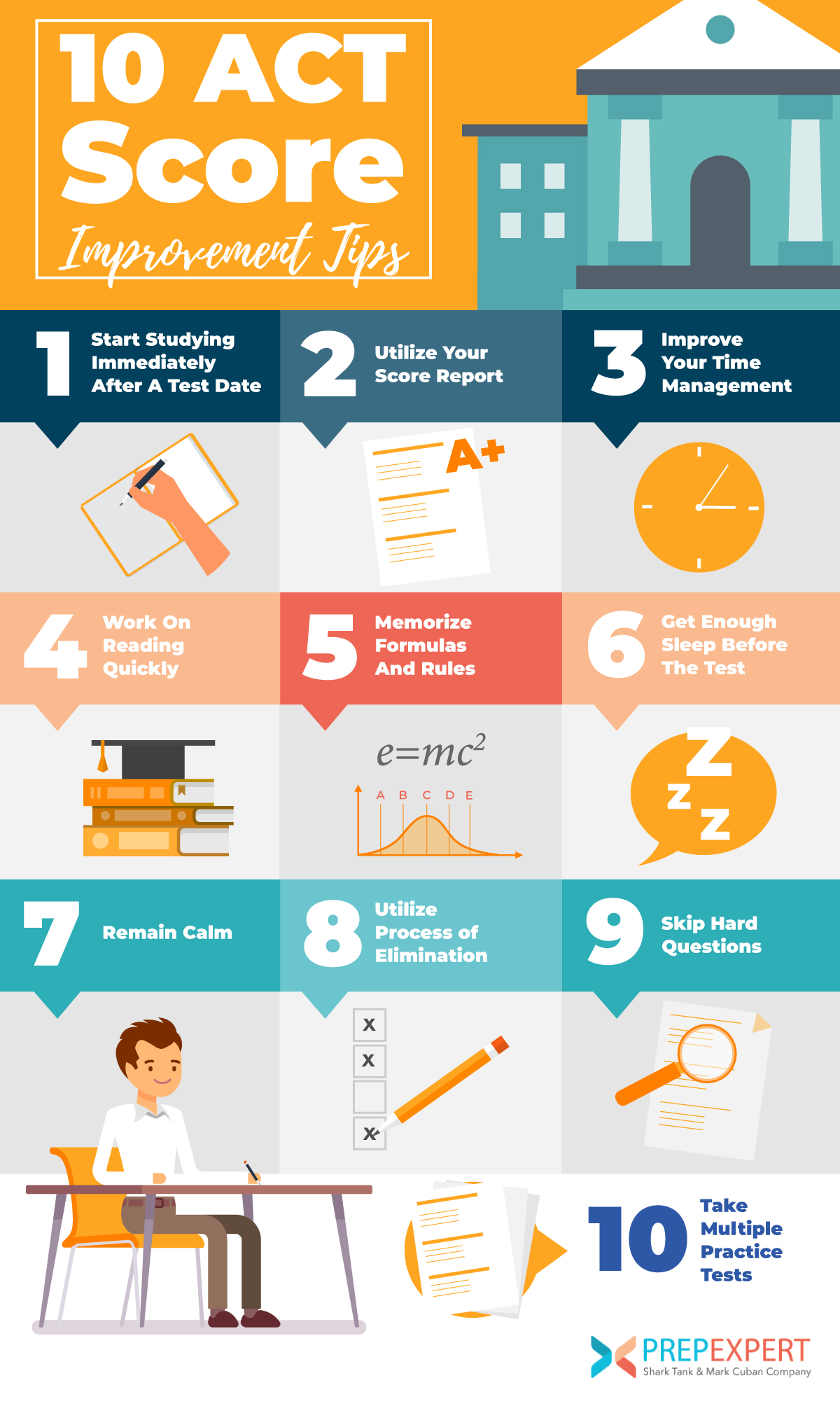10 ACT Score Improvement Tips
Scoring a perfect 36 on the ACT is difficult, especially on the first try. However, even if you don’t do so, you can always improve your overall ACT score from one test date to the next, as long as you plan ahead and consistently work hard.
Here are 10 easy-to-do ACT score improvement tips that you can use when both studying and on test day itself.
Don’t forget to check out our various ACT test prep options today, before signing up for your test date.
[act_one]
Start Studying Immediately After A Test Date
After you complete your first ACT attempt and immediately know you’d like to retake it, start taking notes.
As quickly as you can, write down everything can remember about the test as you took it. Write down anything that confused you, was unexpectedly difficult, sections you felt confident on, anything along those lines. Record those impressions as much as you can while fresh.
[leadmagnet_five]
Those notes will help you plan for your next test date because now you’re aware of exactly what to focus on next time. While your scores report will help too, these other notes will help immediately plan your next steps. Furthermore, you can compare those impressions to your actual scores to see whether you were correct or incorrect regarding where you need to improve.
Utilize Your Score Report
Whether it’s good or bad, use that score report to your advantage.
Your ACT results are available approximately 2-8 weeks after taking the test. You can access them either online, or receive a hard copy in the mail. Besides your total score and section scores, pay particular attention to the subscores. These are where you will receive the greatest benefit for your next prep round.
Look at the Detailed Results section and look for the lowest subscores. Now you have a good idea of where focus your next study round. Moreover, studying can be more manageable because you know exactly what to fix versus the first time out, where you weren’t 100 percent sure of what you would and wouldn’t score well on.
Improve Your Time Management
Time management is critical when it comes to the ACT, even more than on SAT.
The ACT is notorious for the limited time available to answer each section. If you don’t set and maintain a steady pace while moving through it, then you won’t answer everything. It’s as simple as that. However, if you skip over too many questions just to make the time limits, then you’re risking a low score there.
The easiest way to work on your time management is to keep a stopwatch with you when taking practice tests and time each section under test-taking conditions. That way you’ll find out how well you’re keeping pace with each section, in relation to handling the questions in them. You’ll then know which ones give the most trouble of finishing fully on time.
Work On Reading Quickly
Reading fast effectively will also help with overall time management.
Many of the ACT’s sections, such as English and Science, are heavy on reading a lot of information without much time to do so. During your test prep then, it’s important to have a strategy for reading the written passages quickly while gleaning the information you need to answer the questions. Practicing skimming will help tremendously on just about every section.
For Reading section questions, you can try only reading the first and last sentences of each paragraph or the first and last paragraphs entirely, while skimming the body sections. For the English and Science sections, try reading sentences only directly associated with the questions you’re answering with perhaps the immediately preceding ones for context if necessary. Try multiple strategies and see which ones work for you on each section via practice tests.
Memorize Formulas And Rules
Another trick to help save time while improving your score is to find what content you can commit to pure rote memorization.
For example, Math formulas and grammar concepts are straightforward enough to memorize with practice. Your ability to recall them without thinking will prove helpful on the ACT, especially on the Math section, which doesn’t provide references to use.
You must then have a number of basic formulas memorized and ready to go, including:
- Slope-intercept formula
- Quadratic formula
- Area of triangles
- Pythagorean theorem
- Special types of triangles (30-60-90, isosceles, equilateral, etc.),
- Area of a circle
- Circumference
- Area of a sector
- Area of a rectangle
- Area of a parallelogram
- Area of trapezoid
- Trigonometry functions (sin, cos, tan, SOHCAHTOA)
Apply the same approach to basic grammar rules as well for the English and Reading sections. You will save time with a better chance of answering questions correctly by doing so.
[act_two]
Get Enough Sleep Before The Test
Everyone has different requirements for sleep, but a minimum of eight hours is a great target to hit.
Don’t waste energy and sleep on cramming for the ACT! If you aren’t ready for it the night before, there’s no amount of cramming that will prepare you mentally and emotionally for the next day. Going into a live test exhausted will not only sap what little energy you do have when testing starts, but will quickly destroy your focus.
[leadmagnet_two]
Both of those conditions will lower your score, no question about it. Get to bed early then and make sure to eat a good meal too beforehand. Give your body as much energy as possible, so you’re refreshed and eager the following morning. Your mind will be ready and your body will be able to handle the pressure better.
Remain Calm
Handling stress while taking the ACT makes a difference in your final score.
If you can keep calm while minding the time limits, then your chances of scoring high improve. Many students understandably deal with anxiety if they’re forced to skip questions because they’re stumped at that moment. Remember that if you have to do so, it’s ok. Move onto what’s next.
Another tool that can help is meditation; taking time before the test itself to focus on your breathing while calming your mind has been shown to reduce anxiety. Reduced anxiety means that your focus will be on what you’re solving, not your fear of failure. If you need to, work on these skills while taking practice tests.
Utilize Process of Elimination
Another time-saving tip you’ll benefit from is using the process of elimination.
Remember that when it comes to ACT reading, there is only one totally correct answer for each question. That means that any question that doesn’t look 100 percent correct gets immediately crossed out. The benefit here is instead of debating whether an answer is correct or not, look for reasons to get rid of it entirely.
If you see any flaw based on the information provided, then get rid of it as a choice. If what’s left cannot be discounted at all, then chances are good that you’ve found the right answer. You won’t waste any time wondering between two answers on which is correct either.
Skip Hard Questions
Another time-saving tip to use, as long as it’s done carefully, is skipping questions that eat up too much time initially.
Remember that with time running against you, it’s better to go through and answer all the questions you can easily first, then circle back to those harder ones to tackle with the remaining time. In general, if you’re spending at least 30 seconds on a question and you have no idea how to crack it then move on.
For each section, the amount of time you should dedicate per question before skipping differs:
- English: around 30 seconds
- Math: around 60 seconds
- Reading: around 45 seconds
- Science: around 45 seconds
If you hit those time limits per question on those sections and can’t crack it, then move on. It’s better to build time to make up ground, then lose time and not finish what you can answer confidently.
Take Multiple Practice Tests
Before taking the ACT, you need to put in plenty of practice.
Approach it like playing a sport; don’t go in without knowing how the test works, how much time you have to finish, and a good idea of what you’ll be facing on it. That’s why it’s a necessity to take as many practice tests as possible for various reasons.
First, you will get used to the format itself, including the timing restrictions, bubble sheet, and question-wording. Second, you will quickly learn where your strengths and weaknesses are per section. To find out, after taking a test, calculate your total score out of 36 for each section to find the composite score, plus calculate the subscores too.
The real insight will come from the subscores. Perhaps there are specific subsections where you find the lowest point gains; if so, then it’s easy to focus your attention there. If you are experiencing significant enough losses across the entire test, then you may need to work harder overall to find those deficiencies. Take the time to find those problems, work on them, and then take another practice test. You’ll quickly see if you’re improving, and by how much, quite easily.
How Prep Expert Can Help You
Don’t forget, our purpose is to help you learn the strategies and insights that have helped thousands of students score well on the ACT.
Taught by our 99th percentile-scoring instructors, these strategies are put into practice through our various homework assignments and weekly practice tests. Together, this work will allow you to both find and address your problem areas on the test before having to take it for real.
Ultimately, our aim is to help you achieve your goals for both school and life by providing the tools to overcome this first hurdle in the process – your test score.
Be sure to check out our various class options, from in-person, live online, to self-paced video on demand, to find one that fits your goals and schedule. Our classes are available year-round, so there’s no reason to wait.
If you liked this article you might also want to check out our article on the Average ACT Score for Sophomores.
[act_three]
For more test strategy, college admissions, and scholarship application tips sign up for our FREE class happening right now!
Written by Todd Marcus
More from Todd Marcus

ACT Reading Passage Types | What To Expect
Be ready for the ACT Reading section by knowing the kinds of things you'll be reading. Here are the ACT…

Taking The ACT Junior Year
If you're ambitious and want to give yourself plenty of time for score improvement, then consider taking the ACT junior…

ACT 2020 Score Release Dates
Here then are the ACT 2020 score release dates to plan around, as well as, the different kinds of available…











